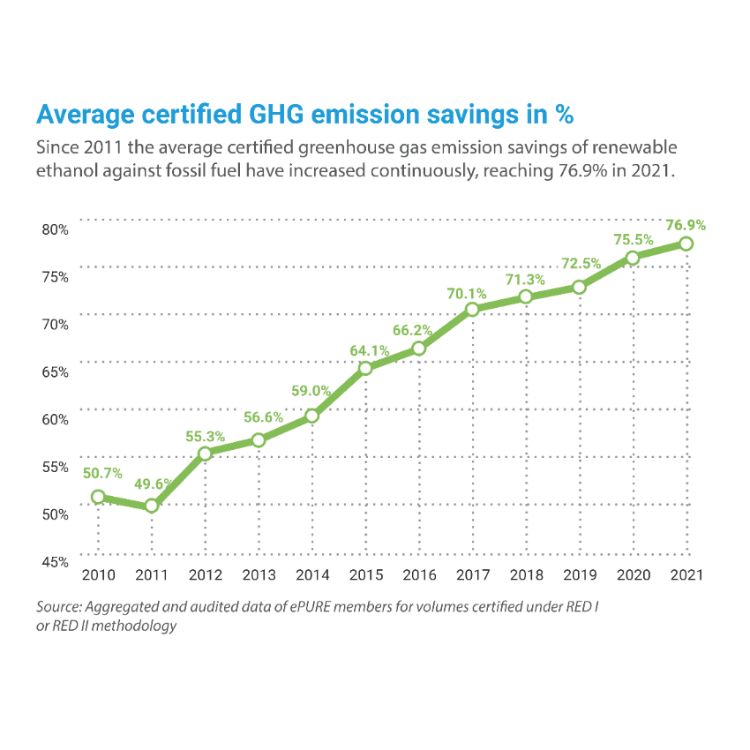EU lawmakers wisely rejected attempts to reduce the role of sustainable biofuels in the fight against climate change. Now it’s time to unleash their potential, says David Carpintero
Is the EU’s ‘Fit for 55’ package finally getting fit for purpose? After more than a year of impassioned debate, lawmakers generally agree that reducing emissions from transport requires a major role for sustainable biofuels.
That’s important, because biofuels such as renewable ethanol – produced from European crops, wastes and residues – are the most immediate, affordable, sustainable and socially inclusive solution the EU has to reduce emissions from the petrol and hybrid cars that will predominate on Europe’s roads for a long time.

“Biofuels such as renewable ethanol are the most immediate, affordable, sustainable and socially inclusive solution the EU has to reduce emissions from petrol and hybrid cars that will continue to predominate on Europe’s roads
Renewable ethanol has a proven track record in the fight against climate change – with 77 per cent average emissions savings compared to fossil petrol – and keeps improving its GHG�reduction performance as European biorefineries keep innovating. It requires no expensive new infrastructure. It makes an impact on emissions now and will help Member States meet increasingly ambitious targets for de�fossilisation of transport.
Production of renewable ethanol in Europe has other important benefits, notably in contributing to EU food security. Contrary to the misleading and discredited arguments about ‘food vs fuel’ that were heard during the Fit for 55 debates on biofuels, EU ethanol production contributes to food security.

In fact, in 2021 European renewable ethanol biorefineries produced more high-protein animal feed than fuel – helping ensure an important domestic supply. This was achieved with no deforestation or land grabs: ePURE members’ ethanol production in 2021 required less than 1.8 million hectares (Mha) of European arable land, equivalent to only 1.7 per cent of the total arable land of EU27 and the UK.
Also, renewable ethanol production creates captured biogenic CO2, which displaces fossil CO2 in greenhouse applications and in production of carbonated drinks.
All of this was taken into account when the European Parliament wisely rejected amendments that would have placed further restrictions on European crop-based biofuels, which are already capped at a maximum of 7 per cent of Member States’ road and rail energy and subject to strict sustainability criteria. Such restrictions would have made it harder for Member States to reach their decarbonisation objectives and increased EU dependence on imported fossil fuel.
The outlook is more uncertain when it comes to CO2 standards for cars. Here legislators are thinking more narrowly – favouring battery electric vehicles but leaving open the possibility for ‘CO2 neutral’ liquid fuels to play a role.
Europe needs a range of solutions to decarbonize transport — including renewable ethanol — not just one technology that isn’t yet fully attainable for all segments of society. A more realistic EU approach would make it clear to citizens that there are no ‘zero emission’ cars. Measured on a full life�cycle, there are always emissions and always costs.
Europe needs a range of solutions to decarbonize transport — including renewable ethanol — not just one technology that isn’t yet fully attainable for all segments of society. A more realistic EU approach would make it clear to citizens that there are no ‘zero emission’ cars. Measured on a full life�cycle, there are always emissions and always costs.
A socially inclusive transition to carbon neutrality should empower all citizens, not just those who can afford new technologies, and all countries, not just those that can afford new infrastructure. As they put the finishing touches to the Fit for 55 picture, EU policymakers must preserve a continued role for sustainable biofuels – which have shown they can deliver results today and adapt to future needs. The only alternative is an unacceptable one: opening the door to more imported fossil fuel.
David Carpintero is Director General of ePURE, the European renewable ethanol association. @DCLASN

If Europe is to successfully decarbonise the transport sector, Barbara Thaler warns against putting all our ‘eggs in one basket’ and over relying on battery electric vehicles
As Parliament’s RED III Rapporteur in the Transport and Tourism Committee, I know the huge potential biofuels and efuels has for our environment, our economy, and for Europe´s independence. Consequently, I always advocated for the internal combustion engine.
It is the origin of the energy that matters, not the type of engine. This is exactly the point where all the heated debates start. Technology neutrality versus command and control, top-down versus bottom-up approach. And of course, the measurement, of the life cycle versus tailpipe.
Witnessing the historically high electricity prices at this very moment, I cannot even imagine what the dependency on raw materials for battery electric vehicles will do in terms of affordability
The latter leads to a 100 per cent electro mobility future. A life-cycle approach on the other hand combines affordability, reliability and sustainability while substantially increasing our resilience.
The Parliament is deeply divided on this issue, but a slim majority has emerged which wants to see 0g CO2 by 2035, measured at the exhaust of vehicles. We might be witnessing the beginning of the end of the internal combustion engine - at least for the short time. Nonetheless, I am still optimistic, that Europe learnt its lesson. Putting all our eggs in one basket is not the smartest solution, regardless of whether we are talking about energy or mobility. It tends to backfire.
Witnessing the historically high electricity prices at this very moment, I cannot even imagine what the dependency on raw materials for battery electric vehicles will do in terms of affordability, once there is no more alternative available.
Therefore, I see a realistic chance that the “lifecycle approach” will be in place with the planned revision of the legislation. Then cars fuelled with biofuels and efuels will be counted as climate neutral as their battery-electric peers. In the end, common sense will prevail. Coupled with the innovative and unchallenged efficiency of a true market economy, we will succeed to forge affordability, reliability and sustainability into one piece of legislation.
Meanwhile, we have to focus on the unintended consequences of our policy choices. As a first step, I tabled a written question, together with 46 colleagues, to the Commission asking how they intend to deal with the shortage of raw materials. At the end, there is no progress at all, if we just change one dependency with another one. It also does not help much in terms of reaching our climate goals. The Commission itself assumes that in 2040, 80 per cent of the cars on the road will still have a combustion engine, so biofuels and efuels are needed.
Please don’t get me wrong here. I do believe that battery-electric vehicles will find their place in the market. Nevertheless, a successful and sustainable decarbonisation of Europe’s mobility sector demands competition among all options available. I sincerely believe technology neutrality is the only way to kill two birds with one stone: protecting the climate and keeping Europe competitive.
MEP Barbara Thaler is a member of the Transport and Tourism Committee
Sign up to The Parliament's weekly newsletter
Every Friday our editorial team goes behind the headlines to offer insight and analysis on the key stories driving the EU agenda. Subscribe for free here.